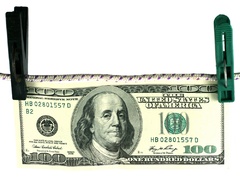Q: I have a home equity line of credit for $50,000. I have had it for 5 years and owe nothing on it. As I recently lost my job, that line of credit is a means to survive.
My question is, do I try to grab all of it at once as a financial cushion or would that send up red flags? Should I grab $45,000, and leave a little room at the top? Is that less obvious or less damaging for my credit score? Is there a different optimal amount to take? My equity in the house is conservatively $190k.
A: Your question is particularly timely, since so many lenders and creditors are clamping down on lines of credit that they deem too risky – which these days is apparently everyone.
I have heard from some of my sources who work for credit card companies that the federal government is requiring lenders and creditors to have cash on hand equal to, in some cases, 40 to 50 percent of the credit that has been extended in the form of available credit on a credit card, or a home equity line of credit (HELOC). To the regulators, the fact that you haven’t borrowed from your HELOC up until this point doesn’t mean that you won’t eventually tap it to help you make it through a tough time, like a job loss.
So, if you have a $50,000 line of credit, the federal government might require your lender to have $10,000 to $20,000 in cash on hand, just in case you borrow against your line of credit and then default.
In fact, the federal government wants banks and lenders to keep even more cash in their reserves as more Americans lose their jobs, and tap the line of credit to pay ordinary living expenses, like groceries and gas for the car.
What I’m hearing from creditors is that this level of cash on hand is unsustainable given how much credit everyone has been extended over the past two decades. So, everyone’s credit is going to be clamped down.
For example, if you have a credit card that you haven’t used in 12 months, it may be closed by the lender or the amount of total available credit reduced. We’re hearing from thousands of Americans who have had their home equity lines of credit reduced or closed. Not only does this make it difficult to access the credit you’ve so carefully preserved but it will also tarnish your credit score.
Credit experts say that 30 percent of your credit score is looking at the credit you have available. If you have less credit available (because the credit card company or HELOC lender has cut you off), that will take some points off of your credit score.
To your question: You have to tread delicately. If you don’t take money out of your credit line, you may be one of those that ends up having the credit limit cut and later regret that you didn’t take the money out when you could. But taking a sizable amount of money without a source to pay back the funds can put you in a precarious situation.
Let’s think about how this would play out: If you tap 80 to 90 percent of your line of credit, you will hurt your credit score at least a little. But if your credit line is cut substantially, that too might hurt your credit score, as you’ll have less available credit.
Optimally, you’d never tap more than 25 to 30 percent of a line of credit – in your case, you’d only want to take $12,500 to $15,000. Anything more than that could lower your score a little, depending on other factors in your credit history. But since you might actually need the cash, it’s better to take it now rather than want it later and not be able to access it.
Just remember, this isn’t play money. It has to last until you find a new job and then you have to pay it back, with interest. So spend it carefully and with any luck, you’ll find a new job soon. Make sure you understand the risks of taking the money out if you decide you have to. Remember, your home equity line of credit is tied to your house, so if you stop making the payments, you will put your house at risk of foreclosure.
Good luck.
May 15, 2009.







Leave A Comment